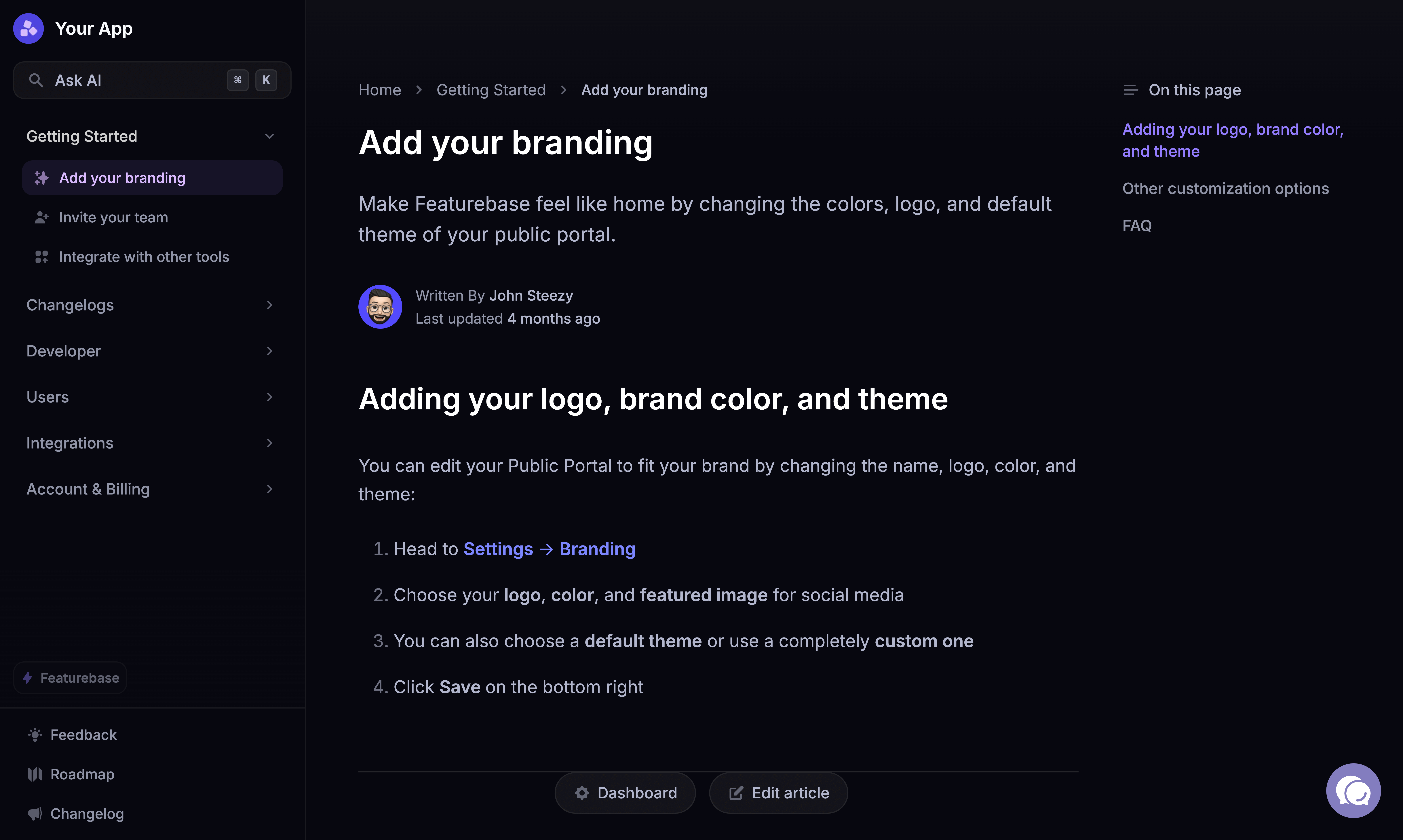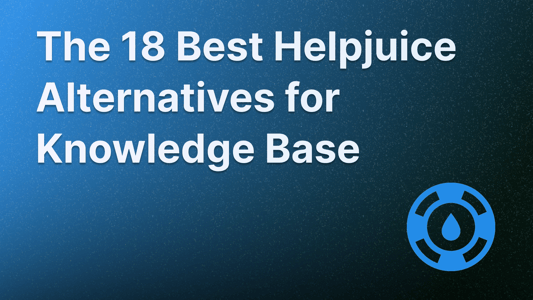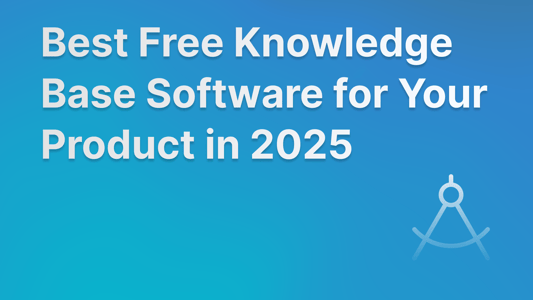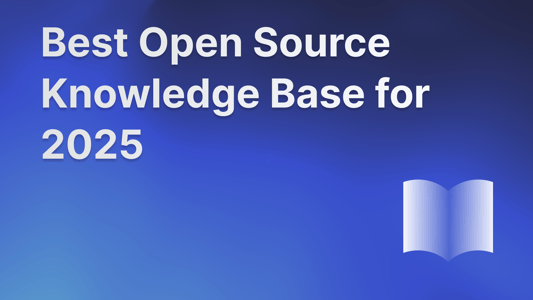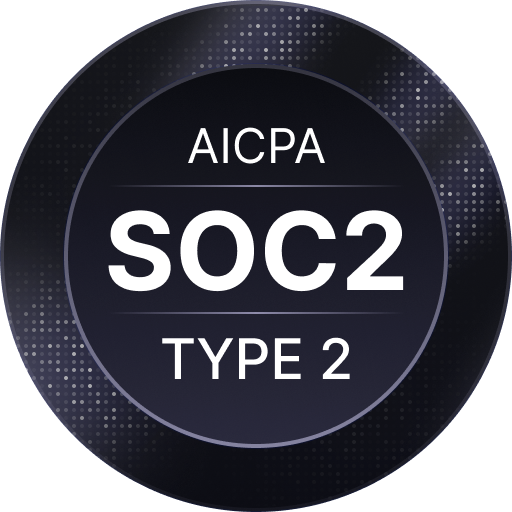Blog Customer Service14 Best Knowledge Base Software for Businesses in 2026
14 Best Knowledge Base Software for Businesses in 2026
The best knowledge base software to provide exceptional customer service and support to your customers or internal team members.
Mile Zivkovic
Content @ Featurebase

Did you know that 91% of customers would prefer using a knowledge base over talking to a customer support representative if given the choice? Self-service customer support is the future, and for many businesses, the easiest and cheapest entry into this world is knowledge base software.
These tools let you create, organize, and manage your internal knowledge so that customers can easily troubleshoot their problems without involving anyone from your team.
But knowing you need knowledge base software is the easy part. The hard part is choosing the right tool because they're all pretty similar.
We've gathered the best entries today to help you make an educated decision on your next knowledge management software. 👇
TL;DR: The best knowledge base software in 2026
- ✨ Featurebase - Best overall modern and powerful knowledge base software for startups
- Confluence - Best for internal team collaboration and structured documentation, especially for Jira users.
- Zendesk - Best for customer support teams needing an integrated help desk and knowledge base.
- Document360 - Best for creating a standalone, AI-powered knowledge base with strong categorization and search features.
- Helpjuice - Best for businesses that need an advanced, highly customizable knowledge base with analytics.
- Guru - Best for AI-driven knowledge sharing within teams, with a focus on real-time content verification.
- Bloomfire - Best for enterprise knowledge sharing with AI-powered search and content discovery.
- Nuclino - Best for lightweight, real-time team collaboration and structured documentation.
- Notion - Best for highly flexible, all-in-one documentation, note-taking, and database management.
- Slite - Best for remote and asynchronous teams needing a structured knowledge-sharing platform.
- Zoho Desk - Best for businesses that combine customer support with an integrated knowledge base.
- Proprofs - Best for creating simple self-service documentation for customers and employees.
- Tettra - Best for Slack-first teams looking to manage an internal knowledge base with AI-powered answers.
- Stonly - Best for high-volume customer support teams. Companies use Stonly for both agent-facing and external customer knowledge.
- KnowledgeOwl - Best for an easy-to-use knowledge management tool without added complexities.
What is knowledge base software?
Knowledge base software is a cloud-based tool that helps businesses store, create, and manage a self-service library of information about a product or service, business operations, or any topic.

Knowledge base tools typically help with:
- Customer support
- Internal documentation
- Product documentation
- Employee training and onboarding
- Collaboration and knowledge sharing
- Process standardization
- SEO and content marketing
- Reducing repetitive inquiries
- Creating legal documentation and complying with the law
- Providing technical support and troubleshooting
In short, having a knowledge base can help just about any business. But there are so many options out there, and choosing the right knowledge base software can be a chore.
But no need to worry, as we'll show you exactly what to focus on when considering your next knowledge management solution.

Create a beautiful AI-powered Help Center
Give customers the answers they need. AI-native, beautiful, and built for usability
Best knowledge management software features to look out for
Realistically speaking, any website can be a knowledge base with some organization. However, proper knowledge base software has various features that make it easy to organize and access information.
1. Content organization and structuring
Good knowledge base software lets you organize content with categories, tags, and folders and create a content hierarchy from most to least important. This makes adding new content easy, and for the users, it means finding what they want without breaking a sweat.

2. AI-powered search and summaries
Some of the best knowledge base software has built-in AI search that allows users to ask questions. The answers are then pulled from the knowledge base, which makes it easy for the end users to have a natural conversation rather than go through an endless search query.
The end user should get automated suggestions based on their queries, helping them resolve problems more quickly.

3. Collaboration and editing tools
Multiple teams and people will be working on your knowledge base: the customer support team, marketing, sales, developers, and just about anyone who wants to help maintain the knowledge base.
Collaboration features let multiple users create and edit content simultaneously. Ideally, the right knowledge base software will have version control features so you know who added what and when.
4. Access control and permissions
Most knowledge base software lets you select who has access to relevant articles in a knowledge base.
For example, your support team can only access one portion, your developers have access to something else, and the users have curated access to the most relevant articles.
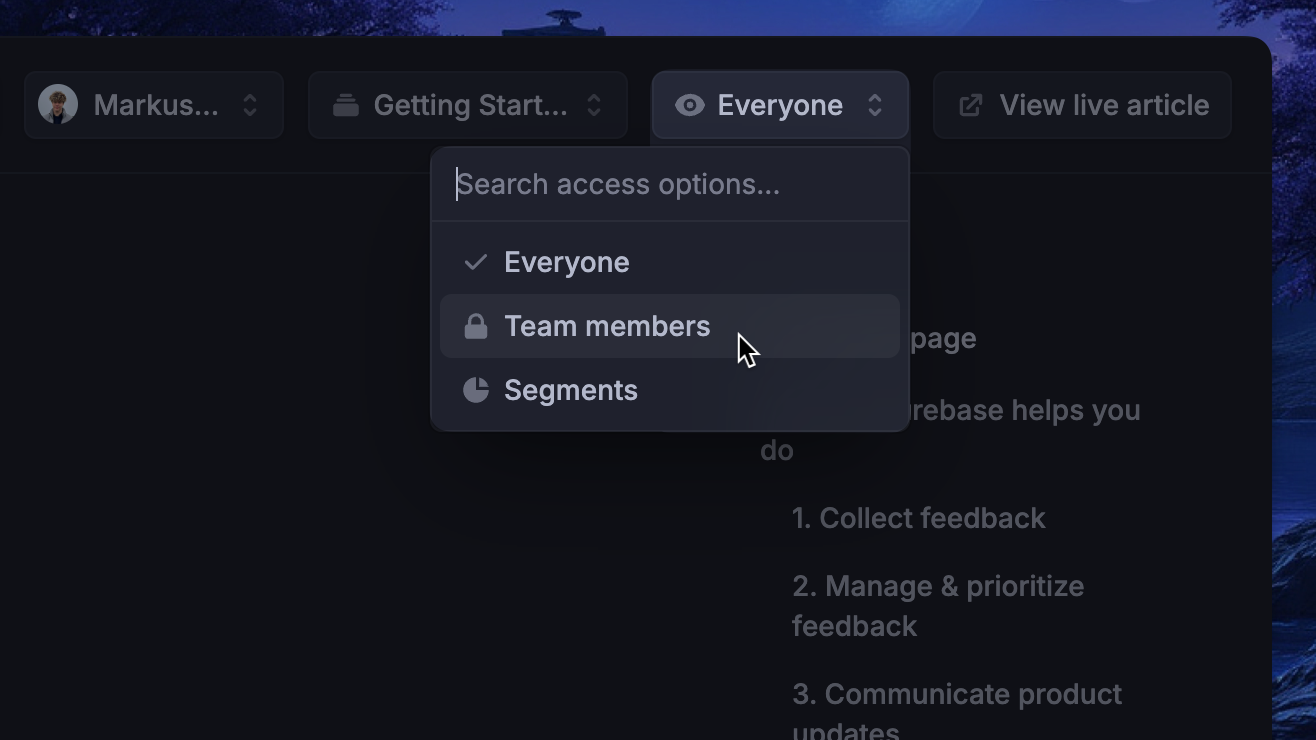
5. Feedback and knowledge improvement
A comprehensive knowledge base lets users tell you how they feel about your entries. Features such as user ratings, feedback collection, and suggestions for improving content help you create an even better knowledge management system.

6. Customization and branding
External knowledge bases are typically shown on a business website. A solid knowledge management platform allows you to customize its look so that the knowledge base feels like a part of the website or SaaS product.
In the knowledge management system, you should be able to add your colors, brand logo, and a bit of custom code if necessary.
7. Knowledge base analytics
The analytics part of the tool shows you what people search for, which articles are popular, and how effective the content is. This lets you refine your knowledge management efforts and, more importantly, fix the problems that get the most support tickets and search queries.
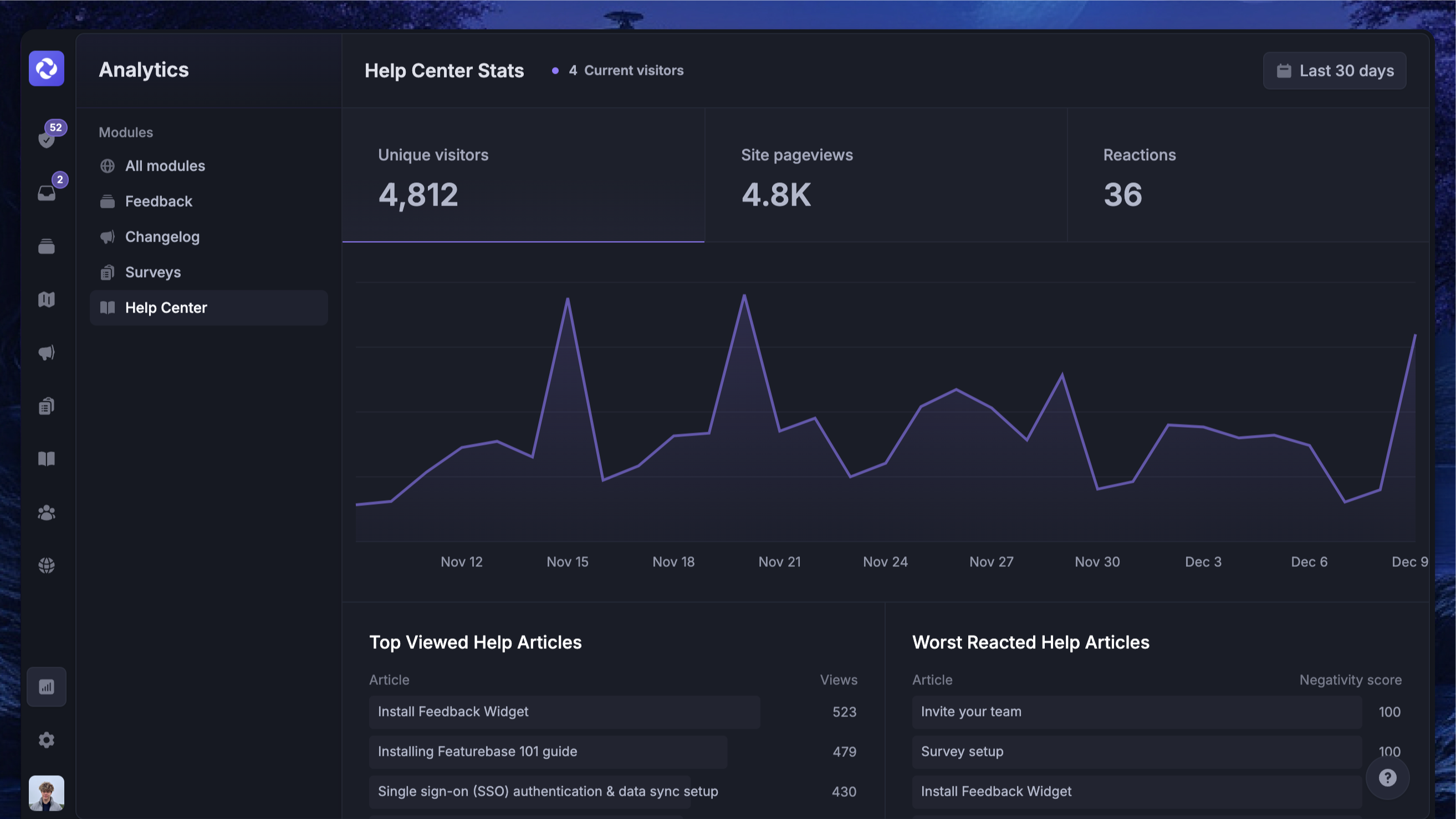
8. Integrations with other tools
Advanced knowledge base software solutions let you connect the dots between the knowledge base articles and the rest of your company's data. Some handy integrations are those with CRMs, customer support tools, project management software, and others.
If you want even more options, get a knowledge management tool with API access.
9. Multilingual support
The best knowledge base software is available all around the world. You'll have support for language translation and localization so that customers or support agents can find relevant entries. Ideally, the most intuitive knowledge base software should have AI translations.
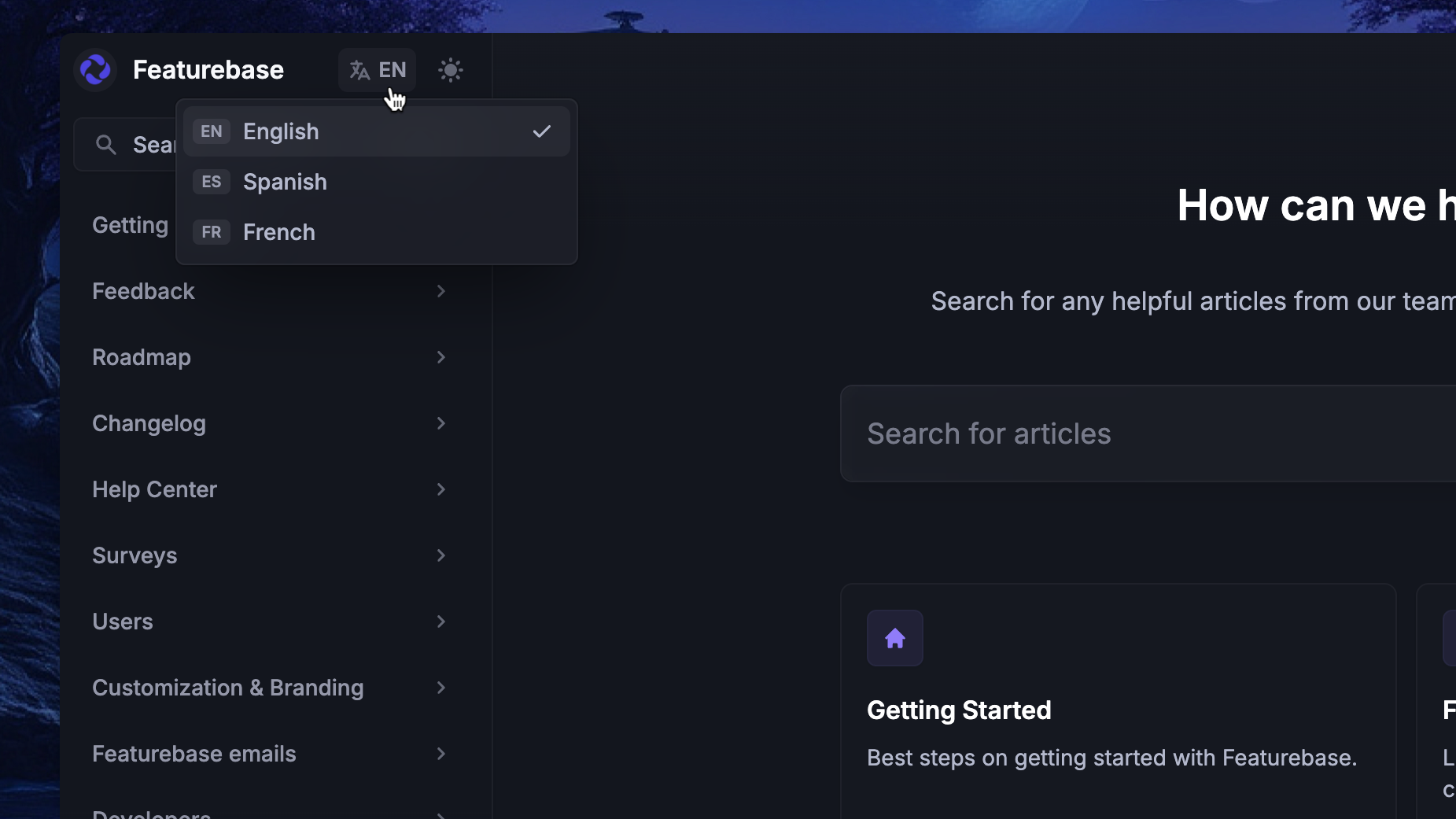
10. Version history
A comprehensive internal knowledge base will have plenty of changes. You should be able to revert to previous versions with just a few clicks.
Having auto-backups is hugely helpful, too, in case something happens with the knowledge base and you need to save all of your data.
11. Security and compliance
Depending on whether you need an external or an internal knowledge base, you'll need various security features. For example, data encryption, SSO, and two-factor authentication.
If you're in a highly regulated industry, look for knowledge base solutions that comply with GDPR, and if you're an enterprise, then HIPAA and SOC 2 as well.
The best knowledge base software to try in 2026 and beyond
These are some of the best knowledge base software choices for 2026, with their pros, cons and pricing. Your choice will depend on your audience (external vs. internal knowledge base) and its size, your existing tech stack, budget, and other factors. Let's help you find your pick. 👇
1. Featurebase ✨

Featurebase is one of the best modern and powerful knowledge base tools. It helps you create beautiful product documentation quickly and brings articles to your users with in-app widgets. It comes with affordable pricing and a free plan. You can set it up in minutes, and we can help you migrate over from your old knowledge base with zero data loss.
Top features:
- Public & internal knowledge base: Restrict access to certain articles only to select user groups or teammates
- Custom branding: Fully customize your help center with your brand colors and a custom domain
- Notion-style text editor: Tons of formatting options and custom components
- AI-powered search: Summarise answers for users right in the search bar in seconds
- 40+ language support: Automatically display content in your users' native language
- In-app widget: Serve help articles directly within your app, reaching users where they need assistance most
- Real-time analytics: See your articles scores and visits to improve the low performing ones and more
- Plus, feedback voting community, product roadmaps, changelogs, and customer surveys—all in one place
Pricing: Featurebase comes with a generous Free plan, and you can try the paid ones with a 10-day free trial. Pricing starts at just $29 per user per month.

Create a beautiful AI-powered Help Center
Give customers the answers they need. AI-native, beautiful, and built for usability
2. Confluence

Confluence is a collaboration platform developed by Atlassian, designed to help teams create, organize, and share content efficiently. It suits organizations seeking a centralized space for knowledge management and project collaboration.
Top features:
- Real-time editing: Allows multiple users to edit documents simultaneously, making for easy collaboration across teams.
- Whiteboards: Provides an infinite canvas for brainstorming, drawing, and visualizing ideas, enhancing creative processes.
- Databases: Enables dynamic connection and organization of information, allowing teams to aggregate data from various sources and visualize it in customizable formats.
- AI assistance: Use artificial intelligence to improve communication by transforming notes into polished documents and providing automated page summaries.
- Integrations: Connects with tools like Jira, Figma, and Google Docs, ensuring a cohesive workflow across different platforms.
Considerations:
- Learning curve: New users may require time to adapt to Confluence's extensive features and interface.
- Performance issues: Some users have reported slow loading times, particularly with large documents or complex pages.
- Cost scalability: As team size increases, subscription costs can become significant, which may impact budgeting for larger organizations.
Pricing: starts at $5.75 per user/month for the Standard plan, with a free plan available for up to 10 users.
3. Zendesk

Zendesk is a comprehensive customer service platform that offers a suite of tools designed to enhance customer support and engagement. It is suitable for businesses of all sizes seeking to manage customer interactions across various channels effectively.
Top features:
- Unified agent workspace: Provides a centralized interface for agents to manage customer inquiries from email, chat, voice, and social media.
- Customizable help center: Enables the creation of a branded knowledge base, allowing customers to find answers independently and reducing the volume of support tickets.
- AI-powered bots and automation: Use AI to handle common customer queries, route tickets, and provide agents with suggested responses, enhancing efficiency.
- Robust analytics and reporting: Offers pre-built and customizable dashboards to monitor key performance indicators, customer satisfaction scores, and agent productivity.
- Extensive integrations: Connects with over 1,000 apps and integrations, including CRM systems, e-commerce platforms, and productivity tools, to support workflows.
Considerations:
- Pricing structure: The cost may be higher compared to some competitors, which could impact budgeting for smaller teams or startups.
- Complexity of setup: Implementing and customizing Zendesk to fit specific business needs may require dedicated resources and time.
- Learning curve: Due to its extensive features, new users might need time and training to use the platform's capabilities fully.
Pricing: starts at $55 per agent/month for the Suite Team plan, billed annually.
4. Document360

Document360 is an AI-powered knowledge base platform designed to help organizations create, manage, and optimize self-service knowledge bases for both internal teams and customers. It is suitable for businesses looking to centralize documentation, reduce support tickets, and enhance information accessibility.
Top features:
- User-friendly knowledge base editor: Provides a markdown-based editor that supports rich text formatting and media uploads, allowing teams to create well-organized and visually appealing articles without advanced technical skills.
- Advanced categorization and tagging: Enables organizing content into hierarchical structures with robust categorization and tagging systems, simplifying navigation and information retrieval.
- Multi-language support: Allows the creation and management of multilingual knowledge bases, enabling businesses to serve a global audience with translated documentation.
- AI-powered search: Features advanced search capabilities that understand user intent and context, delivering more precise and relevant results to user queries.
- Integrations and extensions: Connects with popular tools like Zendesk, Intercom, and Microsoft Teams, allowing teams to integrate their knowledge base into existing workflows.
Considerations:
- Pricing structure: The cost may be higher compared to some competitors, which could impact budgeting for smaller teams or startups.
- Learning curve: Setting up a well-organized knowledge base with multiple categories and subcategories can be overwhelming for first-time users, potentially requiring time to familiarize themselves with the platform's features.
- Customization limitations: While offering various customization options, some advanced modifications may require assistance from the support team or additional technical resources.
Pricing: not available publicly: you have to reach out to get a quote.
5. Helpjuice

Helpjuice is a cloud-based knowledge management platform designed to assist organizations in creating, organizing, and maintaining centralized knowledge bases. It caters to businesses of all sizes, helping improve internal collaboration and providing self-service options for customers.
Top features:
- User-friendly content editor: Offers a rich text editor with multimedia support, letting users create and format articles without previous experience in development.
- Advanced search functionality: Incorporates intelligent search algorithms, allowing users to locate relevant information within the knowledge base quickly.
- Customization and branding: Provides options to tailor the knowledge base's appearance.
- Analytics and reporting: Delivers insights into user engagement, popular articles, and search trends.
- Access control and permissions: Enables administrators to set role-based permissions, ensuring appropriate access levels for different users and maintaining content security.
Considerations:
- Pricing structure: The cost may be higher compared to some competitors, which could impact budgeting for smaller teams or startups.
- Learning curve: New users might require time to familiarize themselves with the platform's features and interface, potentially necessitating training sessions.
- Customization limitations: While offering various customization options, some advanced modifications may require assistance from the support team or additional technical resources.
Pricing: starts at $120 per month for up to 4 users, with higher-tier plans accommodating more users and additional features.
6. Guru

Guru is an AI-powered knowledge management platform that captures, organizes, and delivers company information within existing workflows. It is ideal for teams looking to centralize their information in a dedicated knowledge base software.
Top features:
- AI-powered enterprise search: Integrates with various tools to deliver personalized, actionable answers directly within your workflow.
- Knowledge triggers: Proactively surfaces relevant information to team members at the right time, reducing the need to search for critical data.
- Browser extension: Provides quick access to the knowledge base from any web page, enabling users to capture and retrieve information without disrupting their tasks.
- Verification workflows: Ensures content remains accurate and up to date by prompting subject matter experts to review and verify information regularly.
- Integrations: Connects with tools like Slack, Salesforce, and Microsoft Teams.
Considerations:
- Learning curve: New users may require time to familiarize themselves with Guru's features and interface.
- Customization limitations: Some users have noted constraints in advanced customization options, which might affect adaptability to specific organizational needs.
- Pricing structure: Costs can escalate as the number of users increases, potentially impacting budgeting for larger teams.
Pricing: Guru's pricing starts at $25 per user/month.
7. Bloomfire

Bloomfire is a knowledge management platform that enables organizations to capture, organize, and share internal information effectively. It is designed to enhance collaboration and accessibility, making it suitable for teams across various industries seeking to centralize their knowledge resources.
Top features:
- AI-powered search and discovery: Uses AI to index and retrieve content across multiple file types, ensuring users can quickly locate relevant information.
- Content authoring and management: Offers tools for creating, editing, and organizing content, including automatic transcription of video and audio files.
- Customizable layouts and branding: Allows organizations to tailor the platform's appearance and structure to align with their branding and meet specific user needs.
- Integration capabilities: Connects with various third-party applications such as Slack, Salesforce, and Microsoft Teams.
- Advanced analytics and reporting: Provides insights into content engagement and usage patterns, enabling continuous improvement of knowledge resources.
Considerations:
- Pricing transparency: Specific pricing details are not publicly disclosed and require direct consultation with Bloomfire, which may complicate budgeting decisions.
- Customization limitations: Some users have reported constraints in advanced customization options, potentially affecting the platform's adaptability to unique organizational needs.
- Learning curve: New users might experience a period of adjustment to fully use the platform's extensive features, necessitating training and onboarding.
Pricing: Bloomfire's pricing starts at $25 per user/month, with costs scaling based on team size and feature requirements.
8. Nuclino

Nuclino is a unified workspace for real-time collaboration among teams. It enables users to create, share, and organize knowledge, documents, and projects within a centralized platform, making it suitable for teams seeking a streamlined and efficient collaboration tool.
Top features:
- Real-time collaborative editing: Allows multiple users to work simultaneously on documents, ensuring up-to-date information and fostering teamwork.
- Flexible content organization: Provides various views such as list, board, table, and graph, enabling teams to organize and visualize content in ways that best suit their workflows.
- Integrated AI assistant (Sidekick): Assists with drafting content, summarizing notes, and generating images, enhancing productivity and creativity.
- Visual collaboration tools: Includes an infinite canvas for whiteboards and diagrams, supporting brainstorming sessions and visual project planning.
- Extensive integrations: Connects with tools like Slack, Google Workspace, and Microsoft Active Directory, ensuring smooth integration into existing workflows.
Considerations:
- Limited offline functionality: Nuclino primarily operates online, and its offline capabilities are limited, which may affect users needing access without an internet connection.
- Basic project management features: While offering essential project management tools, teams requiring advanced functionalities might need to integrate Nuclino with specialized software.
- Storage limitations on lower tiers: The free plan offers 2GB of total storage, which may be insufficient for teams dealing with large files or extensive documentation.
Pricing: starts at $6 per user/month for the Starter plan, billed annually.
9. Notion

Notion is an all-in-one productivity and note-taking platform that combines knowledge management, document collaboration, and task organization. It is widely used by individuals, teams, and businesses to centralize information and streamline workflows.
Top features:
- Customizable workspaces: Users can create a personalized workspace using Notion’s flexible page and block structure, organizing notes, tasks, and databases according to their preferences.
- Powerful databases: Notion allows building databases with filtering, sorting, and relational linking features, supporting tables, kanban boards, calendars, and lists for efficient external and internal knowledge management.
- Advanced note-taking: Supports rich text formatting, embedded media, and markdown, enabling the inclusion of images, videos, code snippets, and even databases within notes.
- Task and project management: Enables task management with to-do lists, kanban boards, and timeline views, integrating reminders and database templates for effective project tracking.
- Collaboration and sharing: Enables real-time collaboration through task assignments, comments, and mentions, with role-based access control to manage viewing and editing permissions.
Considerations:
- Steep learning curve: New users might find Notion overwhelming due to its flexibility and extensive features, requiring time to learn and set up custom structures.
- Limited offline access: Notion requires an internet connection for most functions, and its offline mode is unreliable with limited editing capabilities.
- Overwhelming flexibility: The lack of a predefined structure can lead to decision fatigue, as users must determine how to organize and use the platform effectively.
Pricing: starts at $10 per user/month for the Plus plan, billed annually.
10. Slite

Slite is a team knowledge management software designed to help teams find answers, store knowledge, and plan projects with note-taking. It is popular with remote and asynchronous teams, offering a centralized platform for team collaboration and information sharing.
Top features:
- Collaborative workspace: Allows teams to create, share, and manage knowledge at scale.
- AI-powered assistant: Provides instant answers to team inquiries by searching existing content.
- Customizable templates: Offers a variety of templates that can be tailored to match your team's needs.
- Integrations: Connects with tools like Slack, Google Drive, and others.
- Knowledge management panel: Provides AI-driven insights to view which documents need to be reviewed, deleted, or verified.
Considerations:
- Limited advanced project management features: While Slite excels in knowledge management, teams seeking comprehensive project management capabilities might need to integrate it with other dedicated tools.
- Customization limitations: Advanced customizations may require technical assistance or involvement from development teams.
- Pricing structure: The cost is based on the number of users, which might become expensive for larger teams.
Pricing: starts at $8 per member/month, billed yearly.
11. Zoho Desk

Zoho Desk is a cloud-based customer service platform designed to help businesses manage customer inquiries from multiple channels. It is a decent choice for organizations that want to improve their customer support operations through automation and integrated tools.
Top features:
- Omnichannel support: Handles customer interactions from email, phone, live chat, social media, and web forms within a single interface.
- AI-powered assistant (Zia): Provides sentiment analysis, suggests responses, and automates routine tasks to improve agent productivity.
- Customizable dashboards and reports: Offers insights into team performance and customer satisfaction through tailored analytics.
- Integration capabilities: Connects with other Zoho products and third-party applications, enhancing workflow efficiency.
- Self-service portal: Enables customers to find answers independently through a branded knowledge base and community forums.
Considerations:
- Mobile app limitations: The mobile application may lack some functionalities available on the desktop version, potentially affecting teams that rely heavily on mobile access.
- Complex pricing structure: Some users have reported that the pricing plans can be confusing, requiring careful evaluation to select the appropriate plan.
- Integration challenges: While integration capabilities are extensive, some users have noted difficulties when connecting with specific third-party applications.
Pricing: Zoho Desk's pricing starts at $7 per user/month for the Express plan, billed annually.
12. Proprofs

ProProfs Knowledge Base Software is a cloud-based tool designed to help businesses create comprehensive online documentation, user guides, FAQs, and more. It's suitable for organizations aiming to provide self-service options to customers and streamline internal knowledge sharing among employees.
Top features:
- Customizable templates: Offers a variety of templates that can be tailored to match your brand's look and feel.
- WYSIWYG editor: A user-friendly editor that simplifies content creation without requiring technical expertise.
- Version control: Maintains a history of document changes, allowing easy tracking and rollback to previous versions.
- Access controls and permissions: Enables setting specific roles and permissions to manage who can view or edit content.
- Analytics and reporting: Provides insights into user engagement, popular articles, and areas needing improvement.
Considerations:
- Pricing structure: The cost is based on the number of authors, which might become expensive for larger teams.
- Customization limitations: Advanced customizations may require technical assistance or involvement from development teams.
- Workflow approvals: Some users have noted that the workflow approval process could be more streamlined.
Pricing: starts at $79 per author/month when billed annually.
13. Tettra

Tettra is an AI-powered knowledge management system designed to help teams organize and share information efficiently. It integrates with communication tools like Slack and Microsoft Teams, making it ideal for teams seeking to centralize their knowledge and reduce repetitive questions.
Top features:
- AI-powered instant answers: Tettra's AI bot, Kai, provides immediate responses to team inquiries by searching existing content.
- Strong Slack and Microsoft Teams integration: Users can ask questions and receive answers directly within these platforms.
- Content verification workflows: Subject matter experts can regularly verify and update content.
- Intuitive content creation: A user-friendly editor allows teams to create and organize documentation effortlessly, supporting various formats including Google Docs and markdown files.
- Knowledge gap identification: Tettra enables team members to request new pages or updates.
Considerations:
- Limited content type support: Tettra primarily focuses on text-based documentation, which may not suit teams requiring extensive multimedia support.
- Fewer integrations: Compared to some competitors, Tettra offers fewer integrations outside of core tools like Slack and Microsoft Teams.
- Basic project management features: Teams seeking advanced project management capabilities might need to integrate Tettra with other dedicated tools.
Pricing: Tettra's pricing starts at $4 per user/month for the Basic plan, with a minimum of 10 users.
14. Stonly

Stonly is a knowledge platform built for customer service. Companies use Stonly for both agent-facing and external customer knowledge. It makes knowledge instantly accessible and personalized, ensuring people get the right information exactly when they need it.
Top features:
- Create content that works better for customer support: Helps teams build clear, actionable knowledge with the option to turn complex information into interactive step-by-step guides that are easy for both customers and agents to follow.
- Deliver knowledge proactively: Surfaces the right guidance exactly where people need it by embedding knowledge in web apps, help desks, and other support tools, reducing the need to search.
- Provide accurate answers with AI and powerful search: Uses intelligent search and generative AI to understand questions, route users to the exact right step, and power chatbots trained on your knowledge base.
- Measure impact and improve your knowledge: Offers deep analytics that reveal how content is used, where gaps exist, and how your knowledge base can be optimized for better support outcomes.
Considerations:
- Stonly’s interactive and AI-driven features may be more advanced than what very small teams need.
- Some customization and setup are required to align guides with your existing processes.
- Pricing depends on business size and needs, which may require a consultation.
Pricing: Custom plans with a free trial available.
15. KnowledgeOwl

KnowledgeOwl is a dedicated knowledge base platform designed for businesses that want powerful, easy-to-use documentation software without unnecessary complexity. As a B-Corp certified company serving 3,200+ authors since 2015, KnowledgeOwl focuses exclusively on knowledge management—making it ideal for companies seeking a specialized solution with exceptional customer support.
Key features:
- Intelligent search: Choose from semantic, keyword, or hybrid AI-powered search with typo tolerance, autosuggest, and synonym support
- Granular access control: Reader Groups let you restrict articles and categories to specific audiences for both internal and external documentation
- AI-powered content creation: Owl Intelligence uses advanced prompts to generate article drafts, outlines, and meta descriptions while maintaining your brand's tone and style
- AI Chatbot: Provides accurate, contextualized answers to reader questions with source citations and no hallucinations
- Detailed Analytics: Track article performance, search queries, and reader journeys with detailed reporting
- Full customization: Complete control over HTML, CSS, and JavaScript to match your brand identity perfectly ·
- Article versioning: Stage changes and create new versions before publishing, with full audit history ·
- SAML SSO & remote authentication: Seamless access through existing identity providers like G Suite, Azure AD, or Okta ·
- Developer API: Integrate with your existing tools and workflows
Best for: Small-to-midsize businesses and enterprises that want a easy-to-use knowledge base platform with extensive customization options, thoughtful AI features, and outstanding human support from a team that genuinely cares about documentation.
Pricing: Plans start at $100/month, with discounts available for yearly or multi-year plans + additional discounts for purpose-driven organizations.
Conclusion
Choosing the right knowledge base software is a smart investment in your business, team, and customer satisfaction. Everyone can stay on the same page, find relevant information quickly and spare your customer support team so they handle only the most urgent matters.
Featurebase is one of the best modern knowledge base tools that lets you create beautiful product documentation in minutes—for free. In addition to docs, Featurebase offers powerful feedback collection, surveys, and changelog features to help you build the best product on the market.
It comes with affordable pricing and a free plan. We can help you seamlessly migrate from any existing knowledge base tools. 👇
✨ Create a beautiful AI-powered Help Center with Featurebase for free →

